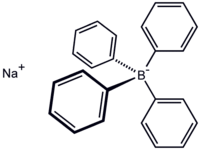Sodium tetraphenylborate
 | |
| Names | |
|---|---|
| IUPAC name
Sodium tetraphenylborate | |
| Other names
Tetraphenylboron sodium | |
| Identifiers | |
| 143-66-8 | |
| 3D model (Jmol) | Interactive image |
| ECHA InfoCard | 100.005.096 |
| PubChem | 2723787 |
| |
| |
| Properties | |
| (C6H5)4BNa | |
| Molar mass | 342.216 g/mol |
| Appearance | white solid |
| Melting point | > 300 °C (572 °F; 573 K) |
| 47 g/100 mL | |
| Solubility | soluble in ethanol |
| Except where otherwise noted, data are given for materials in their standard state (at 25 °C [77 °F], 100 kPa). | |
| | |
| Infobox references | |
Sodium tetraphenylborate is the organic compound with the formula NaB(C6H5)4. It is a salt, wherein the anion consists of four phenyl rings bonded to boron. This white crystalline solid is used to prepare other tetraphenylborate salts, which are often highly soluble in organic solvents. The compound is used in inorganic and organometallic chemistry as a precipitating agent.
Synthesis and structure
Sodium tetraphenylborate is synthesized by the reaction between sodium tetrafluoroborate and phenylmagnesium bromide:[1]
- NaBF4 + 4 ArMgBr → 2 MgBr2 + 2 MgF2 + NaBAr4 (where Ar = aryl)
A related synthesis involves the use of phenylsodium in place of the Grignard reagent.[2]
Unlike smaller counteranions, such as nitrate and the halides, tetraphenylborate confers lipophilicity to its salts. Many analogues tetraarylborates have been synthesized, containing both electron-rich and electron-deficient aryl groups.
The anhydrous salt adopts a polymeric structure in the solid state consisting of Na+-phenyl interactions. As such the salt could be classified as an organosodium compound.[3]
Use in chemical synthesis
Preparation of N-acylammonium salts
Addition of sodium tetraphenylborate to a solution of a tertiary amine and an acid chloride in acetonitrile gives the acylonium salt by precipitating NaCl from the reaction mixture. This method has a broad scope:[4]
- RC(O)Cl + R'3N + NaB(C6H5)4 → [RC(O)NR'3][B(C6H5)4] + NaCl
Sodium tetraphenylborate is also employed as a phenyl donor in palladium-catalyzed cross-coupling reactions involving vinyl and aryl triflates to give arylalkenes and biaryl compounds in good yields and under mild conditions, respectively.[5]
Use in coordination chemistry
Tetraphenylborates are often studied in organometallic chemistry because of their favorable solubility in nonpolar solvents and their crystallinity. For example, the homoleptic trimethylphosphite complexes {M[P(OCH3)3]5}2+ (Ni, Pd, and Pt) have been prepared as their tetraphenylborate salts.[6] Similarly, sodium tetraphenylborate has been used to isolate complexes containing dinitrogen ligands.[7] In the reaction below, sodium tetraphenylborate allows N2 to displace the chloride ligand, which is removed from solution as a precipitate of sodium chloride:
- FeHCl(diphosphine)2 + NaB(C6H5)4 + N2 → [FeH(N2)(diphosphine)2]B(C6H5)4 + NaCl
The use of tetraphenylborate is limited to non-acidic cations. With strong acids, the anion undergoes protonolysis to give triphenylborane and benzene:[8]
- H+ + B(C6H5)4− → B(C6H5)3 + C6H6
Related tetraorganoborates
Weakly coordinating anions often are based on tetraarylborates, with electronegative substituents. Examples include B(C6F5)4− and Brookhart's acid containing the tetrakis[3,5-bis(trifluoromethyl)phenyl]borate anion.
References
- ↑ W. E. Buschman; J. S. Miller (2002). "Synthesis of [MII(NCMe)6]2+ (M = V, Cr, Mn, Fe, Co, Ni) Salts of Tetra[3,5-Bis(trifluoromethyl)phenyl]borate". Inorganic Syntheses. 33: 83. doi:10.1002/0471224502.ch2. ISBN 0-471-20825-6.
|chapter=ignored (help) - ↑ R. M. Washburn, F. A. Billig, "Tetraarylboron Compounds"US Patent 3,311,662.
- ↑ Ulrich Behrens, Frank Hoffmann, and Falk Olbrich "Solid-State Structures of Base-Free Lithium and Sodium Tetraphenylborates at Room and Low Temperature: Comparison with the Higher Homologues MB(C6H5)4 (M = K, Rb, Cs)" Organometallics 2012, volume 31, p. 905−913. doi:10.1021/om200943n
- ↑ J. King & G. Bryant (1992). "Preparation and characterization of crystalline N-acylammonium salts". J. Org. Chem. 57 (19): 5136. doi:10.1021/jo00045a025.
- ↑ P. Ciattini; E. Morera; G. Ortar (1992). "Palladium-catalyzed cross-coupling reactions of vinyl and aryl triflates with tetraarylborates". Tetrahedron Letters. 33 (33): 4815. doi:10.1016/S0040-4039(00)61293-5.
- ↑ J. P. Jesson, M. Cushing, S. D. Ittel (2007). "Pentakis(Trimethyl Phosphite) Complexes of the d8 Transition Metals". Inorganic Syntheses. Inorganic Syntheses. 20: 76. doi:10.1002/9780470132517.ch22. ISBN 978-0-470-13251-7.
|chapter=ignored (help) - ↑ M. Mays & E. Prater (1974). "trans - (Dinitrogen) Bis [Ethylenebis(diethylphosphine)] Hydridoiron(II) Tetraphenylborate". Inorg. Synth. Inorganic Syntheses. 15: 21. doi:10.1002/9780470132463.ch6. ISBN 978-0-470-13246-3.
|chapter=ignored (help) - ↑ Tianshu Li, Alan J. Lough, Cristiano Zuccaccia, Alceo Macchioni, and Robert H. Morris "An acidity scale of phosphonium tetraphenylborate salts and ruthenium dihydrogen complexes in dichloromethane" Can. J. Chem. 84(2): 164–175 (2006). doi:10.1139/V05-236.